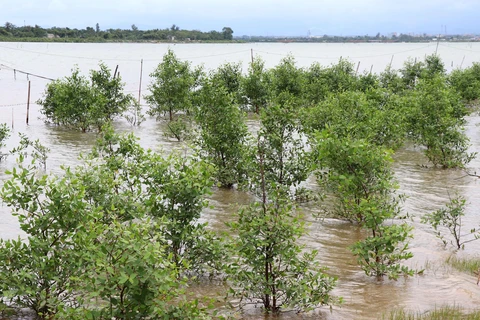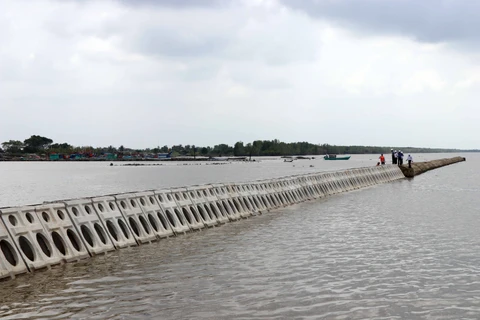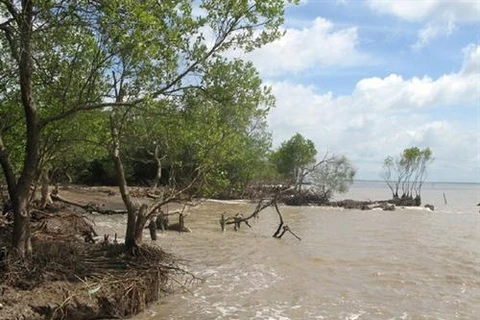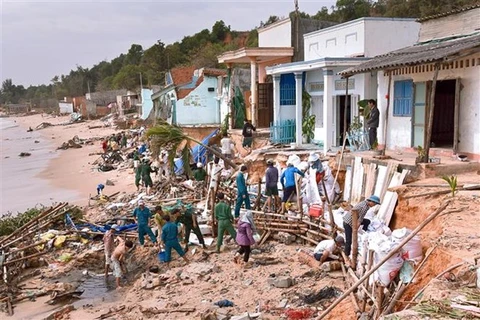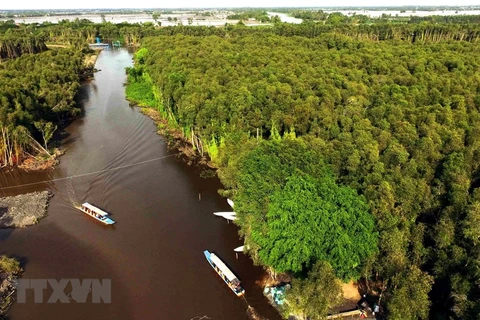Ca Mau (VNS/VNA) – The southern province of Ca Mau has been upgrading the sea dyke on its western coast to combat rising tides and landslides, which are affecting local people's livelihoods.
Ca Mau has over 250 kilometres of coastline of which the western coast, with three districts, accounts for around 108km.
There is a 94km sea dyke especially to protect the coast in the storm season. But in recent years the increasing occurrence of strong tides and waves has been causing more and more landslides, leading to loss of land and sometimes even protective forests.
In the last decade or so the province has lost nearly 9,000 hectares of land and forests. Around 57km of the western coast have suffered landslides, and the sea dyke is at high risk of damage.
To Quoc Nam, deputy director of the the Ca Mau Department of Agriculture and Rural Development, told Nhan Dan (People) newspaper that for many years the province has been repairing and fortifying the sea dyke, but erosion is too frequent, forcing the province to seek aid from the Government.
The dyke’s quick degradation was because the soil underneath was not stable and the relentless sea, he said.
Since 2010 the province has been working on a 72km project to upgrade the sea dyke at a cost of around 1.7 trillion VND (72.6 million USD). Work has been completed on over 49km.
The province's Irrigation Sub-department said to combat climate change and rising sea levels the sea dyke rises three metres.
Revetments have been built to prevent erosion. But people living in high-risk areas are being relocated.
So far the project has proven effective, protecting over 150,000 hectares of desalinated farmlands in the north. The eco-system of the U Minh Ha forest has also been safeguarded and shielded from saltwater intrusion.
Upgrade work has been delayed on the west coast and so locals are still susceptible to tides overflowing the dyke and affecting their crops.
Work on the 23 remaining kilometres of dykes has not begun due to the lack of Government funding.
The province has urged the Government to continue supporting the project, saying it needs billions of dong for the sea dyke as well as for the eastern coast, which does not have a dyke yet.–VNS/VNA
Ca Mau has over 250 kilometres of coastline of which the western coast, with three districts, accounts for around 108km.
There is a 94km sea dyke especially to protect the coast in the storm season. But in recent years the increasing occurrence of strong tides and waves has been causing more and more landslides, leading to loss of land and sometimes even protective forests.
In the last decade or so the province has lost nearly 9,000 hectares of land and forests. Around 57km of the western coast have suffered landslides, and the sea dyke is at high risk of damage.
To Quoc Nam, deputy director of the the Ca Mau Department of Agriculture and Rural Development, told Nhan Dan (People) newspaper that for many years the province has been repairing and fortifying the sea dyke, but erosion is too frequent, forcing the province to seek aid from the Government.
The dyke’s quick degradation was because the soil underneath was not stable and the relentless sea, he said.
Since 2010 the province has been working on a 72km project to upgrade the sea dyke at a cost of around 1.7 trillion VND (72.6 million USD). Work has been completed on over 49km.
The province's Irrigation Sub-department said to combat climate change and rising sea levels the sea dyke rises three metres.
Revetments have been built to prevent erosion. But people living in high-risk areas are being relocated.
So far the project has proven effective, protecting over 150,000 hectares of desalinated farmlands in the north. The eco-system of the U Minh Ha forest has also been safeguarded and shielded from saltwater intrusion.
Upgrade work has been delayed on the west coast and so locals are still susceptible to tides overflowing the dyke and affecting their crops.
Work on the 23 remaining kilometres of dykes has not begun due to the lack of Government funding.
The province has urged the Government to continue supporting the project, saying it needs billions of dong for the sea dyke as well as for the eastern coast, which does not have a dyke yet.–VNS/VNA
VNA

